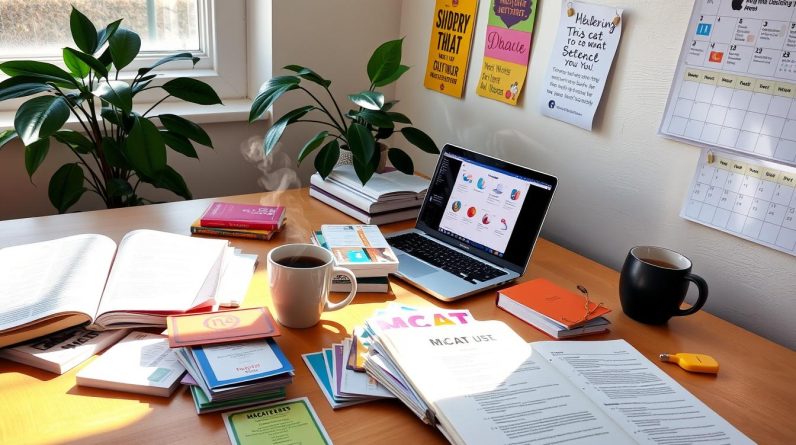Are you ready to unlock the door to your military career? The Armed Forces Vocational Aptitude Battery (ASVAB) is your key. But how can you ensure you’re not just opening the door, but bursting through it with flying colors?
The ASVAB isn’t just another military exam; it’s a pivotal aptitude test that can shape your future in the armed forces. This enlistment test covers a wide range of subjects, from math and verbal skills to science and technical knowledge. Your performance on this comprehensive assessment can determine not only your eligibility for military service but also your career options within the ranks.
Did you know that on the paper version of the ASVAB, you’ll face 25 General Science questions in just 11 minutes? Or that the CAT-ASVAB gives you a whopping 39 minutes for 16 Arithmetic Reasoning questions? These time constraints highlight the importance of preparation and strategy in acing this crucial exam.
In this guide, we’ll walk you through everything you need to know to maximize your ASVAB score. From understanding the test structure to mastering effective study techniques, we’ve got you covered. Let’s embark on this journey to boost your military career prospects!
Key Takeaways
- The ASVAB is a crucial military entrance exam covering various subjects
- Your ASVAB score can significantly impact your military career options
- Time management is critical, with each subtest having specific time limits
- Guessing is better than leaving questions blank on the ASVAB
- Proper preparation and practice tests are essential for success
- Understanding the scoring system can help you strategize better
- Starting preparation well in advance is recommended for optimal performance
Understanding the ASVAB and Its Importance
The Armed Services Vocational Aptitude Battery (ASVAB) is a key test for joining the military. It helps figure out if you’re a good fit for different jobs in the military.
What is the ASVAB?
The ASVAB tests 10 areas, like general science and math. It shows your skills in words, numbers, science, and more. Your score is important for your military career.
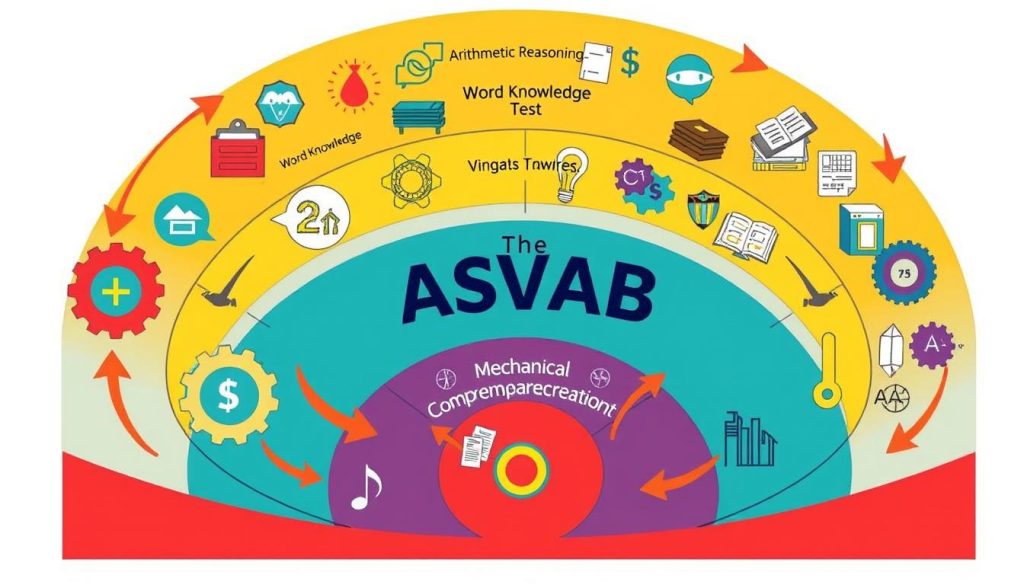
Why your ASVAB score matters
Your ASVAB score is a number from 1 to 99. It shows how you did compared to others. A score of 50 is average. But, a higher score can lead to more job choices and bonuses.
AFQT score and military branch requirements
The Armed Forces Qualification Test (AFQT) score comes from four parts of the ASVAB. It decides if you can join the military. Each branch has its own score needs:
- Army: 31
- Navy: 35
- Air Force: 36
- Marine Corps: 32
- Coast Guard: 40
These are the lowest scores needed. You might need a higher score for certain jobs or if you have a GED. Preparing well for the ASVAB is key to your military career.
Breaking Down the ASVAB Test Structure
The Armed Services Vocational Aptitude Battery (ASVAB) is a detailed military entrance exam. It has nine subtests in the paper version and ten in the computerized format. Let’s look at the structure of this key armed forces qualification exam.
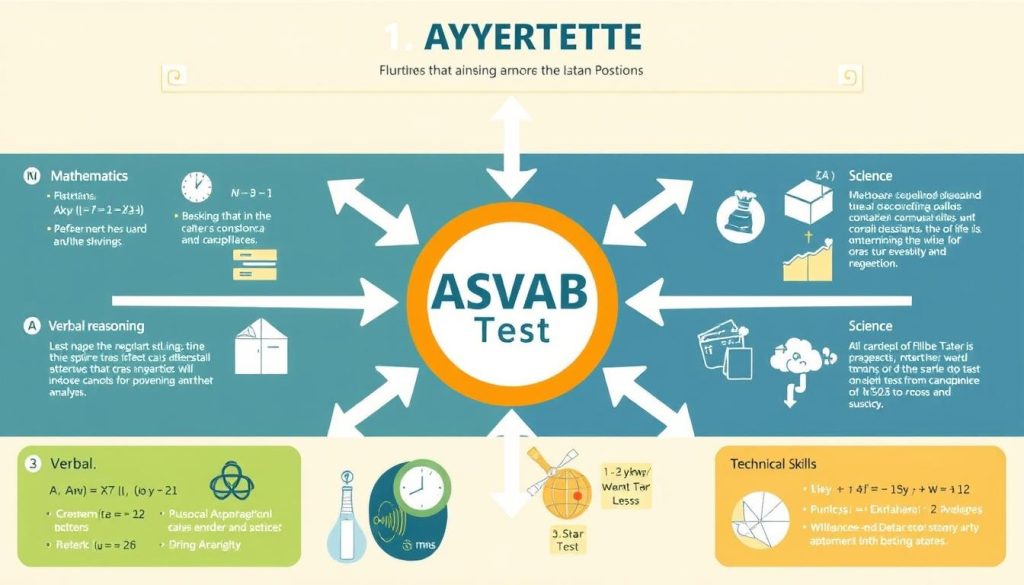
The ASVAB tests a wide range of subjects. Here’s a breakdown of the subtests and their time limits:
- Word Knowledge: 35 questions, 11 minutes
- Paragraph Comprehension: 15 questions, 13 minutes
- Arithmetic Reasoning: 30 questions, 36 minutes
- Mathematics Knowledge: 25 questions, 24 minutes
- General Science: 25 questions, 11 minutes
- Auto & Shop Information: 25 questions, 11 minutes
- Mechanical Comprehension: 25 questions, 19 minutes
- Electronics Information: 20 questions, 9 minutes
- Assembling Objects: 16 questions, 15 minutes
The total test time is 216 minutes, with 149 questions. Your AFQT score, key for enlistment, is based on four subtests. These are Word Knowledge, Paragraph Comprehension, Arithmetic Reasoning, and Mathematics Knowledge.
The computer adaptive test (CAT-ASVAB) adjusts to your performance. It gives easier or harder questions based on your answers. This format has 135 questions and a 198-minute time limit. The paper-and-pencil version has 225 questions to be done in 149 minutes.
“The ASVAB is not just a test; it’s a gateway to your military career. Each section plays a vital role in determining your strengths and potential military occupations.”
Knowing the ASVAB structure helps you prepare well for this important aptitude test. By focusing on each subtest, you can increase your chances of success in this military entrance exam.
Mastering the Math Sections: Arithmetic Reasoning and Mathematics Knowledge
The math sections of the Armed Services Vocational Aptitude Battery (ASVAB) are key to your score. They test your problem-solving and math skills. These are important for many military jobs.
Key Math Formulas to Memorize
To do well, focus on learning key formulas. Here’s a quick guide to important ones:
| Formula | Application |
|---|---|
| d = rt | Distance-Rate-Time problems |
| A = lw | Area of rectangles |
| V = lwh | Volume of rectangular prisms |
| A = πr² | Area of circles |
Strategies for Solving Word Problems
Here are tips for solving word problems in the ASVAB:
- Read carefully and identify key information
- Draw diagrams to visualize the problem
- Break complex problems into smaller steps
- Check your answer for reasonableness
Tips for Managing Time in Math Sections
Time management is key in the ASVAB math sections. You have 39 minutes for 16 questions in Arithmetic Reasoning and 20 minutes for 16 questions in Mathematics Knowledge. Practice mental math and quick estimation to get faster and more accurate.

By using these strategies and practicing, you’ll be ready for the math parts of the armed services vocational aptitude battery. Good luck with your ASVAB prep!
Conquering the Verbal Sections: Word Knowledge and Paragraph Comprehension
The verbal sections of the ASVAB test are key for your military career. They check your language skills, important for many military jobs. Let’s explore how to do well in Word Knowledge and Paragraph Comprehension.

Word Knowledge tests your vocabulary. To improve, read a lot and often. This way, you naturally learn more words.
Try using flashcards with new words and their meanings. Learning root words, prefixes, and suffixes helps guess unfamiliar words. This is useful during the service entry exam.
Paragraph Comprehension tests your ability to understand written info. Practice active reading by summarizing main points after each paragraph. This skill is crucial for success in this section.
Time yourself while reading to get better at speed and accuracy.
- Read a variety of materials daily
- Use flashcards for new vocabulary
- Practice summarizing passages
- Time your reading sessions
Remember, the ASVAB is part of a bigger career exploration program. Your score in these sections can lead to different military roles. Stay calm, manage your time well, and use these tips. With practice, you’ll be ready for the verbal challenges of the ASVAB.
Navigating the Science and Technical Sections
The Armed Forces Qualification Test (AFQT) has science and technical sections. These are key for your career assessment. They cover many topics, testing your knowledge in different fields.

General Science: Key Concepts to Review
For General Science, review basic biology, chemistry, and physics. This section tests your scientific understanding. Focus on earth, physical, and life sciences to improve your score.
Electronics Information: Essential Principles
The Electronics Information section tests your electrical knowledge. Get familiar with electrical basics and circuitry. This section can be tough, so use study guides or workshops to help.
Auto and Shop Information: Important Terminologies
In Auto and Shop Information, you’ll see questions on vehicle mechanics and tools. Learn automotive terms and tool knowledge. This is useful for the test and your military career.
| Section | Key Focus Areas | Recommended Study Method |
|---|---|---|
| General Science | Biology, Chemistry, Physics | Review textbooks, online resources |
| Electronics Information | Electrical principles, Circuitry | Specialized study guides, Workshops |
| Auto and Shop Information | Vehicle mechanics, Tool use | Automotive manuals, Hands-on practice |
Success in these sections boosts your ASVAB score. Spend enough time studying to open up more military career paths.
Effective Study Techniques for ASVAB Preparation
Getting ready for the ASVAB is a big deal. It’s a tool for exploring careers and checking military readiness. Start studying at least two months before the test.
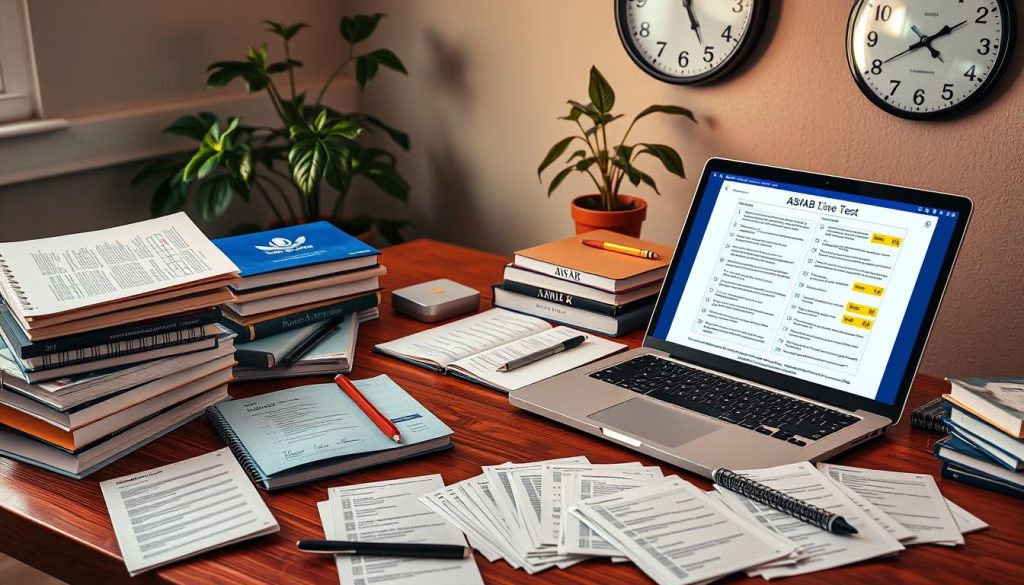
Make a study plan that targets your weak spots. The ASVAB has eight sections for paper tests and nine for computer tests. Spend 60% of your time on math and 40% on verbal.
- Try different study methods like textbooks, online tools, and practice tests
- Use flashcards for words and math formulas
- Set aside time each day for studying
- Take practice tests often to see how you’re doing
Being consistent is crucial. Focus on long-term studying instead of cramming at the last minute. This method improves your study skills for any future career.
“Dedicated studying is essential for ASVAB preparation,” states Peterson’s Test Prep director.
Stick to these study tips and keep up a regular study schedule. You’ll be ready for this important test. Your hard work will help you get the score you need for your military career.
Utilizing Practice Tests and Study Materials
Getting ready for the ASVAB test is crucial for your military career. Practice tests and study materials are essential for your journey.
Benefits of Taking Practice ASVAB Tests
Practice tests make you familiar with the ASVAB format. They show you where to improve. One user’s score went from 28 to 45!
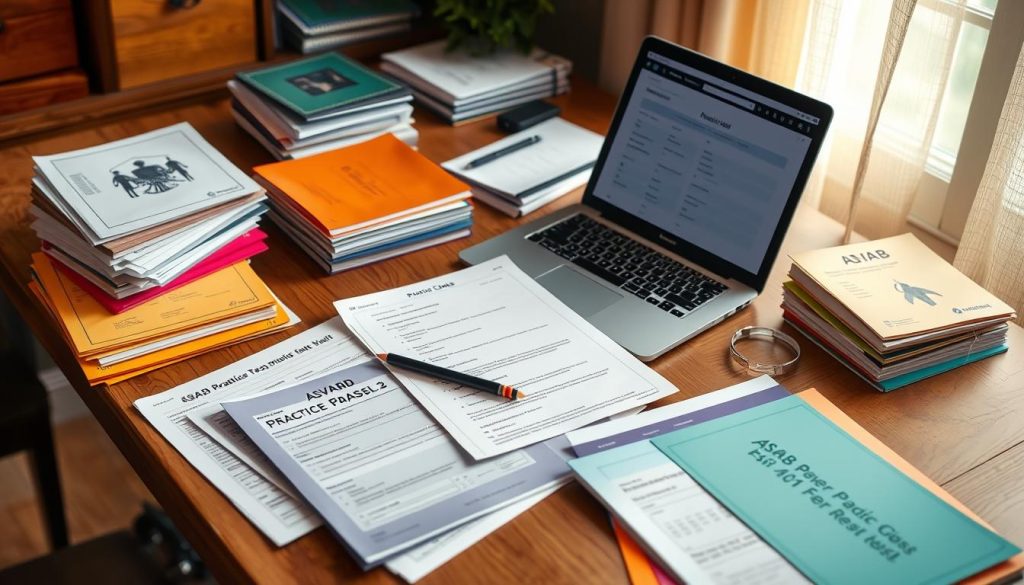
Recommended Study Resources and Apps
ASVAB Boot Camp offers a Complete Study Pack. It gives you a 15% discount on all products. Their Practice Tests Pack has 420 questions for the AFQT section.
Creating a Personalized Study Schedule
Make a study plan for all ASVAB subjects. Spend more time on hard areas. Study at least an hour daily for weeks or months.
| ASVAB Section | Study Time (per week) | Focus Areas |
|---|---|---|
| Word Knowledge | 3 hours | Vocabulary, Definitions |
| Arithmetic Reasoning | 4 hours | Word Problems, Basic Math |
| Mathematics Knowledge | 4 hours | Algebra, Geometry |
| Paragraph Comprehension | 2 hours | Reading Skills, Analysis |
The ASVAB is vital for military career evaluation. Regular practice and smart study can help you pass the test. This opens doors to exciting career opportunities.
Test-Taking Strategies for the ASVAB

The ASVAB is a key test for joining the military. It checks if you’re ready for service. To do well, follow these tips:
- Read questions carefully
- Manage time wisely
- Use process of elimination
- Answer every question
The computer-based test changes based on your answers. Right answers lead to harder questions. Wrong ones make them easier. Guessing is okay, so don’t leave any blank.
Time is important. Spend about 30 seconds on each question. If unsure, guess and move on. On paper tests, you can review your answers before finishing.
Focus only on your test. Comparing with others can distract you. Use your energy to stay confident.
“8 out of 10 people fail the ASVAB on their first try. Practice is crucial for success.”
Boost your chances by joining study groups and using practice tests. Online classes can also help. These tools prepare you for the test’s pressure and pace.
Managing Test Anxiety and Staying Focused
Taking the ASVAB can be nerve-wracking. It’s normal to feel anxious about this aptitude assessment. The key is to manage your stress and stay focused. Remember, this test is a military job matching resource, not a measure of your worth.
Preparation is your best defense against anxiety. Create a study plan that covers all aspects of the vocational skills evaluation. This will boost your confidence on test day. Practice deep breathing exercises to calm your nerves. Try this: breathe in for four counts, hold for four, then exhale for four.

During the test, take short breaks between sections. Stretch, have a sip of water, and reset your mind. Positive self-talk can work wonders. Tell yourself, “I’m well-prepared for this aptitude assessment.” If you start to panic, try grounding techniques. Focus on five things you can see, four you can touch, three you can hear, two you can smell, and one you can taste.
Remember, the ASVAB is just one step in your military career journey. Stay calm, trust your preparation, and do your best. With the right mindset, you’ll be ready to showcase your skills and open doors to exciting opportunities in the armed forces.
ASVAB Scoring System Explained
The ASVAB scoring system is key for joining the military. It shows if you’re ready for service. Knowing how it works helps you prepare well.
Understanding Percentile Scores
ASVAB scores range from 1 to 99. Your score shows how you did compared to others. For instance, a 90th percentile score means you outperformed 90% of test-takers.
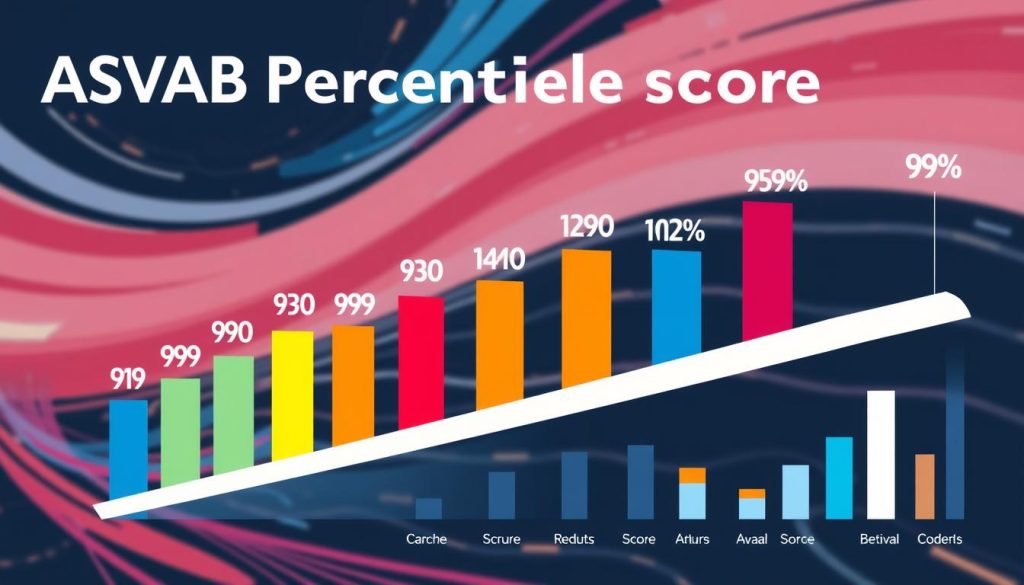
The Armed Forces Qualification Test (AFQT) score is important. It’s based on four ASVAB subtests:
- Arithmetic Reasoning (AR)
- Mathematics Knowledge (MK)
- Paragraph Comprehension (PC)
- Word Knowledge (WK)
How the CAT-ASVAB Adapts to Your Performance
The Computer Adaptive Test (CAT) version of the ASVAB changes question difficulty based on your answers. If you answer right, you get harder questions. If wrong, you get easier ones. This makes the test more accurate and quicker.
Your ASVAB score is crucial for joining the military. It affects your career choices. So, try your best to get a good score!
Common Pitfalls to Avoid on Test Day
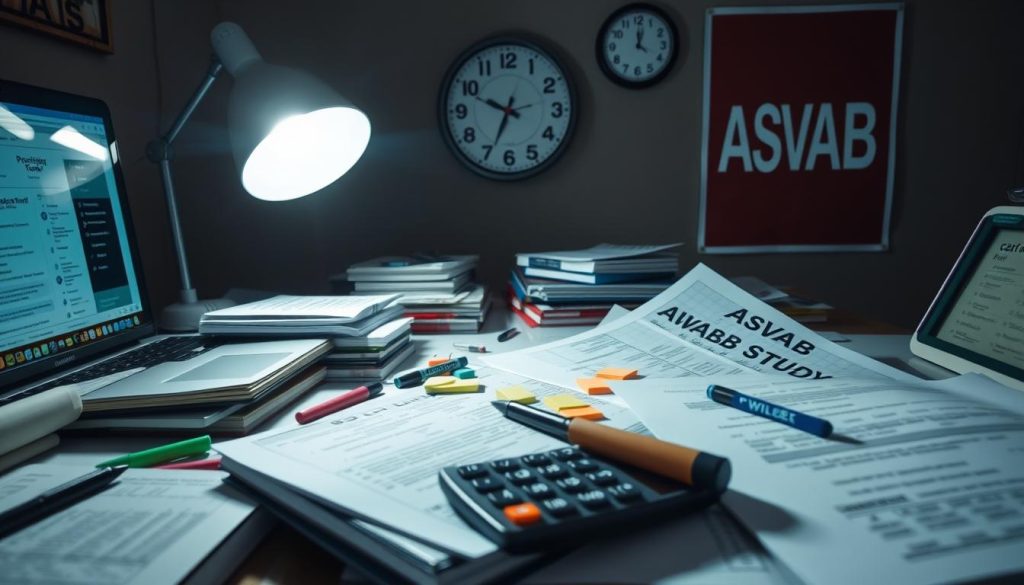
Your ASVAB score can greatly affect your military career. It’s a key test for finding the right job in the military. To do well, avoid these common mistakes on test day.
Don’t show up late or forget your ID. This can stop you from taking the test. Get everything ready the night before. On test day, use your time well. Don’t spend too long on hard questions, especially in the computer test where you can’t go back.
Don’t change your answers unless you’re really sure. Trust your first thoughts. Stay focused and ignore distractions from others. Remember, this test is important for your future, so take it seriously.
| Common Pitfall | Impact | Prevention |
|---|---|---|
| Arriving late | Disqualification | Set multiple alarms |
| Forgetting ID | Denied entry | Pack essentials night before |
| Poor time management | Incomplete sections | Practice timed tests |
| Changing answers | Lower scores | Trust first instinct |
| Lack of focus | Careless errors | Practice concentration techniques |
Avoiding these mistakes will help you show your best on this important test. Remember, the ASVAB opens doors to many military careers.
Physical and Mental Preparation for Test Day
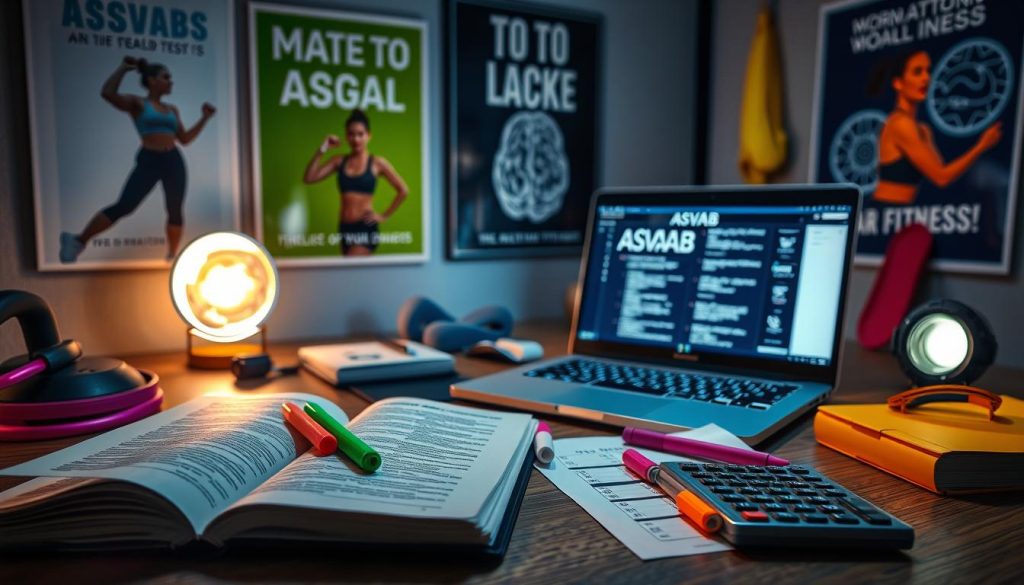
Preparing for the ASVAB test is more than just studying. It’s about getting ready physically and mentally. Your score can decide your military career path.
Wake up early. The ASVAB starts at 6 or 7 AM and lasts 3 hours. Have a balanced breakfast to keep your brain sharp. Drink water, but not too much to avoid bathroom breaks.
The ASVAB is different from school exams. It tests your skills in electronics, mechanical comprehension, and auto shop. You need to study all these areas well.
Mental Preparation Tips
- Use positive self-talk to boost confidence
- Practice relaxation techniques to manage test anxiety
- Visualize success to enhance performance
- Adopt a competitive mindset
Arrive at the test center early. This helps you relax and finish registration. Bring your ID and leave calculators at home – they’re not allowed.
| Do’s | Don’ts |
|---|---|
| Get a good night’s sleep | Cram last-minute |
| Eat a healthy meal | Skip breakfast |
| Stay relaxed | Stress over guessing |
| Bring proper ID | Bring a calculator |
The ASVAB is your chance to start a military career. Go into it with confidence, knowing you’re ready mentally and physically.
What to Expect at the Testing Center
Getting ready for your aptitude test? Knowing what to expect at the testing center can help calm your nerves. The ASVAB is a key tool for finding the right military job. It’s given at 65 Military Entrance Processing Stations (MEPS) in the U.S. and Puerto Rico.
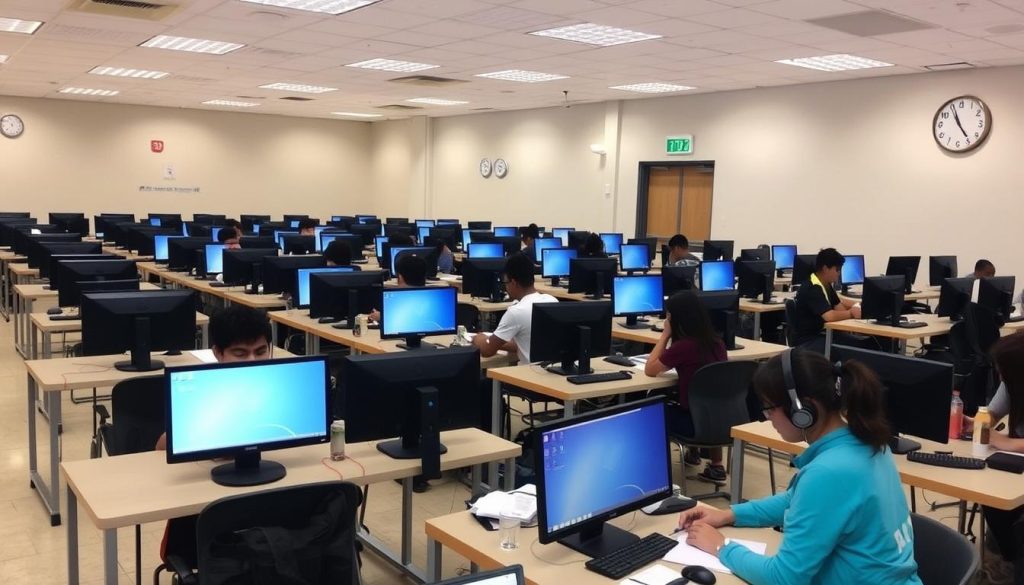
When you arrive, you’ll face strict security. This includes checking your ID and leaving personal items behind. Make sure to bring a valid ID and leave your stuff in the designated area.
The test format can vary. You might take the computer-adaptive test (CAT-ASVAB) or the traditional paper-and-pencil version. The CAT-ASVAB adjusts questions as you go, lasting about 2 hours. The paper version is more common at Military Entrance Test (MET) sites.
- Total questions: 225
- Time limit: 149 minutes
- Overall session duration: 3-4 hours
During the test, you’ll face sections that test your vocational skills. These include Word Knowledge, Arithmetic Reasoning, and General Science. It’s important to follow all instructions to do your best.
Once you finish the ASVAB, you’ll get your scores. CAT-ASVAB results are instant. Paper version scores take a few days. Your scores are crucial for choosing your military career path, so try your hardest!
Post-Test: Understanding Your Results and Next Steps
After taking the ASVAB, you’ll get a detailed score report. This report shows if you’re ready for military service. It’s key for planning your military career.
Interpreting your ASVAB score report
Your score report has scores for each part of the test and your AFQT score. A score of 60 means you did better than 60% of others. The AFQT score, from four parts, shows if you’re eligible for military service.
| Military Branch | Minimum AFQT Score |
|---|---|
| Army | 31 |
| Air Force | 36 |
Options for retaking the ASVAB
If your scores aren’t what you hoped for, you can retake the ASVAB after a month. Your latest scores count, even if they’re lower than before. This chance helps you get better at what you need for your job.
Using your scores for career planning
Your ASVAB scores help you find the right job in the military. They show your skills in words, math, and science. Use the OCCU-Find Database to find jobs that match your scores and interests.
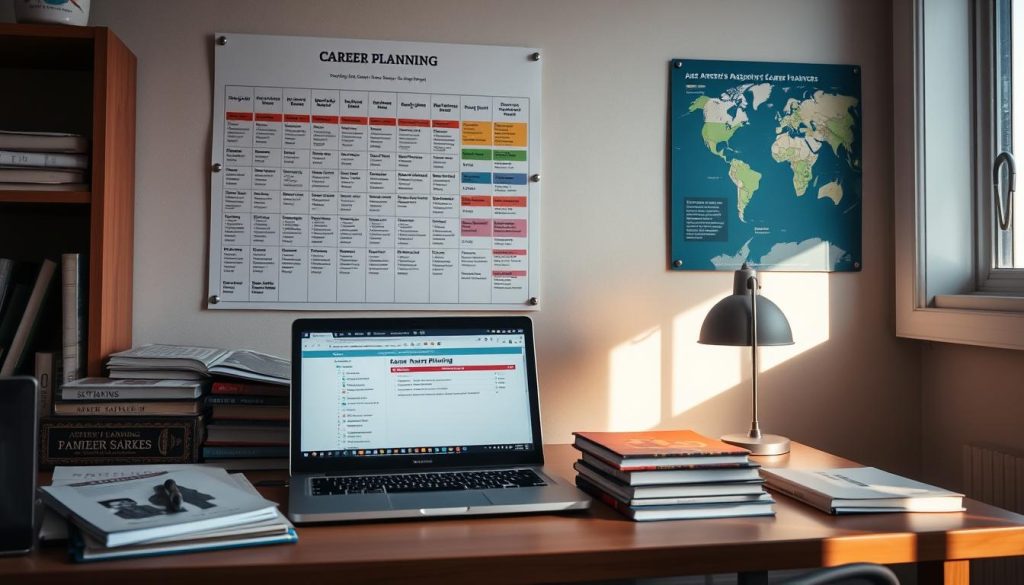
You can look at your ASVAB scores and career resources for two years. Use this time to plan your military career well.
Conclusion
Mastering the Armed Services Vocational Aptitude Battery (ASVAB) is key for your military career. This test checks your skills in nine areas, from science to mechanical skills. With good prep, you can beat the 80% of people who fail on their first try.
Your ASVAB score affects your military chances. It gives you standard scores, an AFQT score, and composite scores. These scores help decide if you’re fit for different military jobs. Each branch has its own score needs, from 31 for the Army to 40 for the Coast Guard.
Good study habits and practice are essential for the ASVAB. Knowing the test, improving weak spots, and managing your time well can raise your scores. With hard work, you’ll do great on the ASVAB and find great military careers.
FAQ
What is the ASVAB?
The ASVAB is a test used for military enlistment and career placement. It has nine subtests that check your skills in math, verbal, science, and technical areas.
Why is my ASVAB score important?
Your ASVAB score, especially the AFQT, shows if you can join the military. Each branch has its own score needs.
What are the minimum AFQT scores for the different military branches?
The minimum AFQT scores are: Army (31), Air Force (36), Navy (35), Marine Corps (32), and Coast Guard (40). Some jobs or GEDs might need higher scores.
What math formulas should I focus on for the ASVAB?
Learn formulas for shapes’ perimeter, area, and volume. Quick math and estimation practice can boost your speed and accuracy.
How can I prepare for the Word Knowledge section?
Study root words, prefixes, and suffixes. Practice finding synonyms and antonyms to improve your vocabulary.
What topics are covered in the General Science section?
This section tests basic biology, chemistry, and physics. Review these subjects to prepare.
What study techniques are recommended for ASVAB preparation?
Use textbooks, online materials, and practice tests. Make flashcards and study regularly. Focus on your weak spots and use active learning.
How can practice tests help me prepare for the ASVAB?
Practice tests get you used to the test format and show where you need to improve. Use official guides, online resources, and apps for practice and a study plan.
What test-taking strategies should I use for the ASVAB?
Read questions carefully, manage your time, and use elimination for tough questions. Stay focused, especially with the CAT-ASVAB, which adapts to your answers.
How can I manage test anxiety during the ASVAB?
Prepare well, use relaxation techniques, stay hydrated, and stay positive. Being prepared helps reduce anxiety.
How are ASVAB scores reported?
Scores are percentiles, showing how you did compared to others. The AFQT score comes from four subtests: Arithmetic Reasoning, Mathematics Knowledge, Paragraph Comprehension, and Word Knowledge.
What are some common mistakes to avoid on test day?
Avoid being late, forgetting ID, breaking rules, spending too much time on hard questions, and changing answers too much.
How should I prepare physically and mentally for test day?
Get enough sleep, eat well, stay hydrated, arrive early, and use positive self-talk and relaxation to stay calm and focused.
What can I expect at the testing center?
Expect strict security, ID checks, and personal item limits. Follow all instructions from the test administrators.
What are my options if I’m not satisfied with my ASVAB score?
If your scores aren’t what you hoped for, you can retake the ASVAB after a month. Your latest scores will count, even if lower. Use your scores to find military careers that fit your skills and interests.

